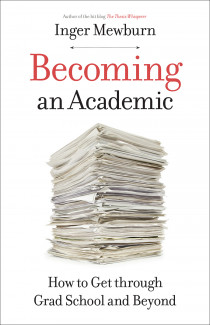
Johns Hopkins UniversityEst. 1876
America’s First Research University
Becoming an Academic

Becoming an Academic is the result of nearly 10 years of blogging on The Thesis Whisperer. The blog has become popular with PhD students and faculty in Australia and the UK as a trusted source of advice for people struggling with the “academic hunger games.” Life in the academy is precarious for most of us these days, and The Thesis Whisperer is a bit like a local city newspaper crossed with an agony aunt column. As a professional research educator, I am well placed to dispense advice and report on various issues of collective interest to people working in academia, either as grad students or professors. I jumped at the chance to put some of the blog content in the form of a book as books are still the most convenient format for transmitting knowledge. A blog is like a large, very untidy attic where individual posts get buried over time; books are finite and “finishable.” It was fun putting this book together as I got to revisit and rewrite some of my older content - and rediscover some of it anew. Some fan favourites, like “The Valley of Shit” (where I write about the strange lack of confidence that often afflicts very talented people) or “Academic assholes and the circle of niceness” (which is about the toxic competitive culture of academia and how to fix it) circulate on social media endlessly, perhaps because of their provocative titles. However, other posts such as “A visit from the procrastination fairy” (about the mechanics of procrastinating and why it feels so good) or “Where do good ideas come from?” (about how to boost your creativity) have become progressively buried over time. The blog is now more than half a million words, so the book stands alone as a kind of academic self-help manual, which I tried to make both accessible and fun. Readers will learn a little bit about Australia too!
I’ve been surprised at how surprised people are by the idea of a professional research educator. I’ve had trouble explaining what my job is for years—even academics don’t really understand it. I think the assumption is that when people finish a PhD, they don’t need any more assistance—which is rubbish, as we are all continually learning. Research education—helping PhD students and faculty write, present and cope with work-related stress—is a well-known role in Australian and UK universities, but less so in the USA. In the past, I think it’s fair to say, many academics viewed support roles like mine in a deficit mode: the writing and learning centres we worked in were treated like rehab centres that you would only go to if you were “broken.” Thank goodness that attitude has really changed. Research educators are like high-performance coaches for all the brain athletes in the academy. We help people be more productive and less stressed (because often these things are related). As just one example, in the Thesis Bootcamp program, which we run at the Australian National University, we help people write 20,000+ words in a single weekend. Last time we ran one of these, 8 people achieved the 20,000-word target, and every one of the 26 people wrote more than 5,000 words. The program is very popular as you can imagine—it’s the academic dream to write half your dissertation in a single weekend! We help people achieve this goal through a mix of the right preparation, applied psychology, writing hacks, and enforced application of bottom-to-seat. . . I share some of the secrets of successful researchers in this book and see it as a good starting point for learning how to be better—and kinder—academics.

A lot of books aimed at PhD students and adjunct faculty are very preachy. Just because you are talking to people at the start of their careers doesn’t mean you have to talk down to them or just tell them what to do. Often they know exactly what to do, but it’s not working for some reason. If only we could talk ourselves out of writer’s block or “just ignore” the actions of bullying co-workers. My approach is always “guide on the side” not “sage on the stage.” I try to help through increasing understanding of what might be going wrong and making a few suggestions about other ways to approach problems. Just like a coach can help you perfect the perfect tennis serve by giving you feedback as you practice, I explain some of the seemingly taken for granted ways that academia works. I talk about why we sometimes get “stuck” with writing, suffer presentation nerves or feel a lack of confidence in our abilities.
Often I draw attention to the systems we work in and how they affect our ability to work, particularly the effects of bias and discrimination. Some of us start closer to the finish line than others. As a white woman, I only suffer a small amount of discrimination compared to many, but I speak out about how some of the taken-for-granted ways of operating in academia privilege some people over others. I also consciously speak from the position of a parent, acknowledging that we all have lives, families, pets, bills to pay, and other responsibilities that affect how much work we can do in a day. Most of the “how to do a dissertation” advice avoids or treats life outside your dissertation, teaching, and writing as unimportant. As much as I love some of these books, I think they often assume we can all say “no” to requests without repercussions or get up at 4am to have “uninterrupted writing time” (never worked for me—toddlers have a well-developed sense of hearing and think you have just decided to start play time earlier). I’ve developed many of my productivity techniques to help make space for the other important things in life, and I hope that people benefit from advice written for real humans, with real lives.
The book was previously published in Australia as How to be an Academic. Many people have contacted me over the last year or so since it came out, thanking me for my advice. People have also told me they thought it was funny and that they enjoyed spending time with my point of view. A couple of people have told me they took it to the beach to read on holiday—the ultimate compliment for a writer! A blog is ultimately ephemeral, while a book is concrete. As I look at the beautiful new cover that JHUP commissioned, I feel proud that the blog will go on to have life in another format. As a lifelong lover of books and reading addict, I am thrilled to be published by such a great press and have the chance to be read on beaches and in cafes. Unlike other similar books, this book did not spell the end of the blog. It’s still going strong, and I hope that this book will introduce new US-based readers to the community.
Inger Mewburn is an associate professor and the director of research training at the Australian National University. She is the author of Becoming an Academic: How to Get through Grad School and Beyond and How to Tame Your PhD. She is also the managing editor of the blog The Thesis Whisperer.



